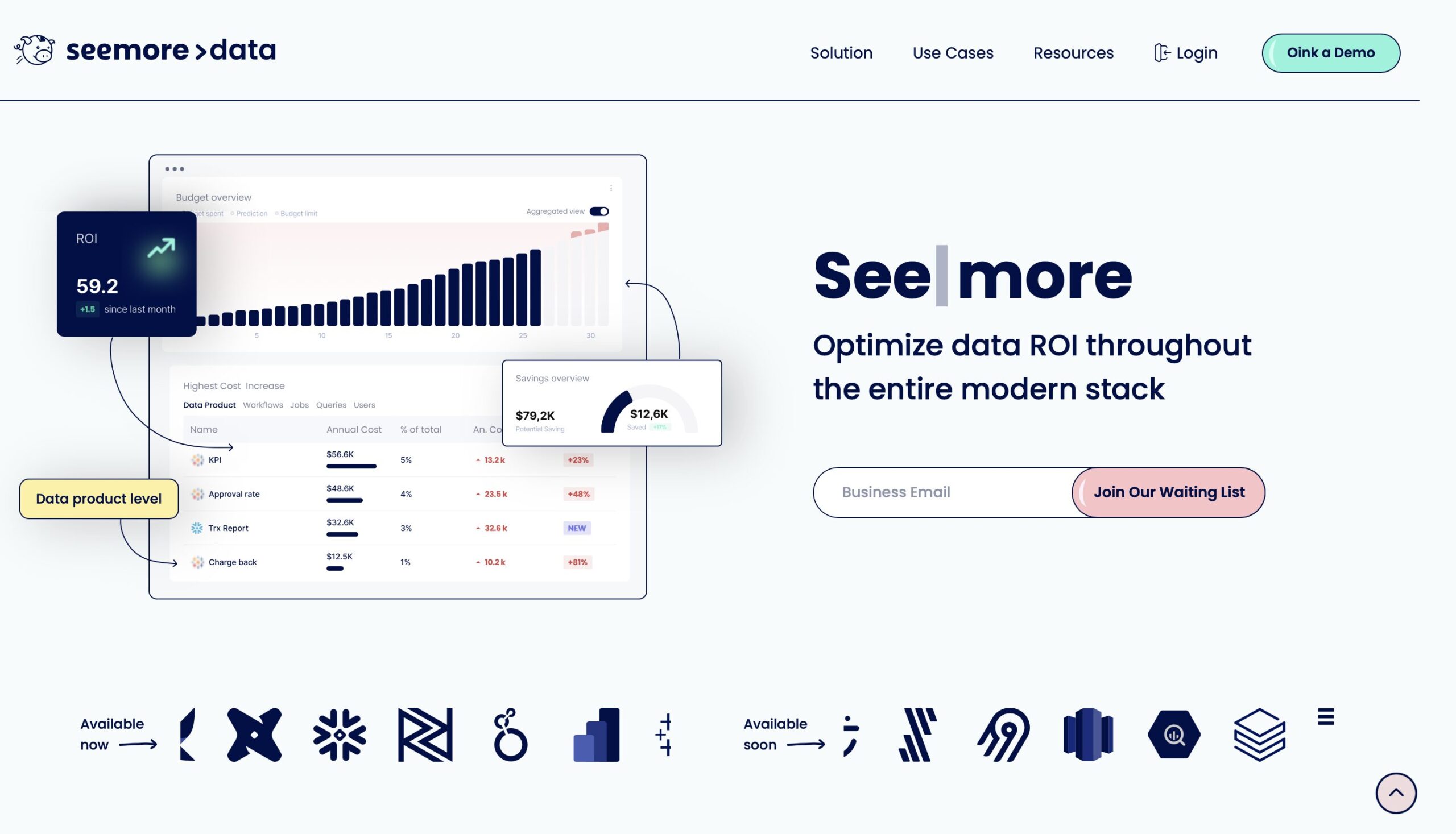Cloud Data Warehouse is a virtual database that allows optimization of data, analytics, scale, and convenience. Cloud-based data warehouses are completely automated and it’s ever-evolving and it updates themselves making it easier and seamless for its users. The automation capabilities of the top tools that are cloud-based make it effortless to get detailed and accurate insights faster.
The world’s top companies offer cloud-based data warehouse tools that not only make it easier for data engineers to easily compute large chunks of data; store, save and deploy it faster than most traditional tools. We have come up with a list of the best 17 cloud-based tools chosen after extensive research based on their features, popularity, and efficiency. Read the entire article to know more about the top cloud data warehouse tools.
1. Firebolt

Firebolt is the number 1 pick in our list of the top 15 cloud-based data housing tools. It has been chosen as the best because of its insane performance, proven to be faster than many established competitors around the world.
Being a complete SaaS platform, users don’t have to worry about the softwares and hardware, but can easily focus on the work. Firebolt’s one-touch scaling and elasticity helps with wrangled configurations and the work is focused primarily on your data and userbase.
Key Features:
-
A transparent business model with efficient at cost-effective pricing.
-
Faster, better, and greater storage, scalability, and 1-128 nodes granular elasticity.
-
Fastest cloud-based data warehouse tool.
Cost:
Various granular pricing models are available beginning from 0.170 dollars an hour.
2. Azure Synapse Analytics

Azure Synapse Analytics is a great warehouse tool with cloud-based data storing capabilities. It allows over 240 TB of data storage for rowstore tables and unlimited data for column store tables. It is used by top companies around the world which includes Unilever, Newell, Marks & Spencer Co.
It provides speedy analytics and data insights for all your data and data analytics systems. Machine Learning models can be applied to all intelligent apps. Users have the discretion to use their preferred programming language.
Key Features:
-
Compatibility with Python, R, .Net, T-SQL, Scala, Spark SQL to carry different analytical tasks.
-
Allows users to build a code-free visual environment to ingest data from any source using its 95 connectors.
-
It has serverless and dedicated options for users to choose from based on their personal or business needs.
Cost:
On-demand pricing, 1.20 dollars an hour. Data storage costs 122.88 dollars/TB or every month.
3. Snowflake

Snowflake is a fast cloud-based data warehouse tool that is automated to match the storage, speed, clustering, and maintain end-to-end encryption. A snowflake account can be hosted on Amazon Web Services, Microsoft Azure, and Google Cloud Platform.
Snowflake complies with the standard CCPA and GDPR data privacy regulations. Snowflake works beyond geographical and institutional boundaries, users can benefit from the seamless multi-functional experience through multiple cloud providers. This tool allows numerous concurrent users to establish best data practices for personal and business uses,
Key Features:
-
Compatibility with ODBC, Node.js, JDBC, .Net, and PHP for connecting apps. Python and Spark to develop apps.
-
The ability to auto-paste functions to avoid accidental spending over unwanted data computation.
-
Unlimited scaling and concurrency from around the world.
Cost:
Different plans are providing various perks. The standard computing costs 2 dollars every hour.
4. Azure SQL Database

Azure SQL Database is an intelligent cloud-based solution for data warehousing. It is scalable and optimized to suit the needs of all users. Fairly automated, this cloud data warehouse tool is driven by its AI features sequentially carrying out different tasks.
The system is flexible and responsive with the ability to Hyperscale storage to suit the ever-changing personal and professional needs. This cloud data warehouse tool comes with layered protection and intelligent threat detection to keep your data far from hackers and internet thieves.
Key Features:
-
Maintains great performance and durability with an SLA of 99.995 percent.
-
Always up-to-date with the latest changes and trends in SQL.
-
Fast storage of up to 100 TB and restoration within minutes providing seamless workflow.
Cost:
There are different plans but the standard plans start from 1.50 dollars DTU and 5 dollars per month.
5. Yellowbrick Data

Yellowbrick Data is a warehouse tool that is modern and works with an MPP analytical database. It allows the storage of the most demanding amount of data. This tool is active, responsive, and works continuously to implement the latest advances in the software.
Yellowbrick Data can be easily deployed to any cloud server may it be public, private, or edge networks. One cool feature of this tool is the 24/7 predictive monitoring ensuring the safety, health, and space within the cloud.
Key Features:
-
Linear scalability for up to 6 TB.
-
Works well with BI, AI, and different MI (Machine Learning) functions.
-
Effective storage of TBs of data on a 200Gb/sec speed.
Cost:
Some packages start from 10000 dollars for a month for all their features.
6. Oracle Cloud Infrastructure

Oracle Cloud Infrastructure is a tool businesses use that is not only easy and accessible but also scales from operations. They aim to provide a seamless, uninterrupted, and automated administration without the constant effort to administrate data. With its easy management, Oracle is a great tool for beginners.
Oracle is a tool that adapts to the changes in business operations by allowing companies to compute their data and manage their storage capacities. This tool also helps businesses to just pay for the tools that they consume and easily switch or tool depending on the changes.
Key Features:
-
Data security is kept intact because of their advanced AE-256 encryption.
-
It is computed to be made ready for future changes in technology.
-
Major benefits are the easy integration and migration to let all your existing data from different warehouses or tools to your OCI warehouse.
Cost:
They provide different plans which are decided by customizing as per your needs.
7. SAP Data Warehouse Cloud

SAP Data Warehouse Cloud is another multi-cloud hybrid data warehouse that is fairly popular in the world of data analytics and management. It is optimized to get all your data in a single streamline making it efficient, enterprise-ready, and increasing the credibility of the data. SAP creates a virtual workspace for all users to connect and interact with no silos.
This tool is ideal for all business sizes because of its malleability, ease of use, scalability, and detailed analysis of data.
Key Features:
-
It is extremely easy to use and deploy.
-
Allows multi-cloud data connection without compromising on context.
-
Analyze all kinds of structured and unstructured data.
Cost:
There are different plans based on customer needs, but standard plans begin from 36 dollars per month.
8. SeeMoreData

SeeMoreData is a powerful cloud data warehouse tool that simplifies data management and analytics for businesses of all sizes. Designed to handle large volumes of data, it offers a scalable and secure platform that ensures seamless data integration from multiple sources. With its intuitive interface, users can easily visualize and analyze data, enabling data-driven decision-making across the organization.
SeeMoreData.io's robust performance and advanced features make it an ideal choice for companies looking to optimize their data workflows and enhance operational efficiency. Its flexible architecture supports a wide range of data formats and sources, making it highly adaptable to various business needs.
Key Features:
-
Scalable and secure data management platform.
-
Seamless integration from multiple data sources.
-
Intuitive interface for data visualization and analysis.
-
Supports a wide range of data formats and sources.
Cost:
SeeMoreData.io offers a tiered pricing model, with options suitable for startups to large enterprises, providing flexibility to match different business requirements.
9. IBM Db2 Database

IBM Db2 Database is one of the most popular cloud computing warehouse tools that allows businesses worldwide. They are known for high-quality analytics and data management tools that suit the interest of companies alike to scale their business administration while their data is being taken care of.
Businesses can choose to deploy their database from either AWS or IBM Cloud. IBM Db2 is considered an advanced tool to get high-quality data insights and storage.
Key Features:
-
All kinds of data are encrypted.
-
Independently manage and scale the storage requirements for your deployment.
-
Back-ups are self-serviced to object storage with point-in-time recovery allowing users to restore data easily.
Cost:
Different plans are starting from 0.136 dollars an hour.
10. Amazon Redshift

Amazon Redshift is one of the most famous cloud-based warehouse tools in the current market. This tool provides analytical solutions to the biggest companies worldwide, Fortune 500 companies, and more, Some famous brands that use Amazon Redshift are McDonald’s, Yelp, Lyft, and Intuit.
It hosts numerous settings that help companies stack and store leaps of data, both structured and non-structured. Being an Amazon product, it derives all benefits from Amazon’s AWS infrastructure.
Key Features:
-
Column-based data storage that increases speed and accuracy.
-
MPP (Massively parallel processing) allows massive heaps of data storage.
-
End-to-end encryption saves your data from any threats.
Cost:
There are numerous plans with different pricing models but the standard one starts from 0.25 dollars per hour.
11. Teradata

Teradata is a multi-cloud computing data warehouse for enterprise analytics. It is flexible and hybrid. The multi-cloud architecture allows you to deploy anywhere including AWS, Azure, and Google Cloud. Also, at your discretion is a dedicated team of expert consultants to help you get the most of the different features and achieve the best output possible.
Some of their biggest clients are Vodafone Germany, Air-France KLM Group, Unilever, and Medibank. Teradata unifies and ingests all data in all formats. It makes it extremely efficient and manages your workload easier.
Key Features:
-
Supports all kinds of data and formats JSON, BSON, XML, Avro, Parquet, and CSV.
-
Malleable as per your need changes with zero up-front costs, pay-as-you-go pricing, and portable licenses between deployment options.
-
In an organizational environment, save time by connecting everything and avoid any silos.
Cost:
Find customized prices for your needs on their website.
12. Apache Cassandra

Apache Cassandra brings to you a SaaS product that is one of the most technically advanced tools on this list. It is a premium product designed for scalability and granular storage of vast amounts of data making it perfect for businesses. This cloud data warehouse tool is designed to withstand an entire system outage without any loss of data.
To maintain the standard and quality of the product, Apache Cassandra has been tested extensively using different schema and numerous real-life use cases.
Key Features:
-
Fault-tolerant, thus saving your data from local outages.
-
Architecture of the system makes it outperform famous NoSQL alternatives and help in real life applications.
-
Ability to withstand a central power outage without losing any data due to the hybrid nature.
Cost:
You can calculate the prices on their website based on your specific needs.
13. Cloudera

Cloudera is one of the last picks of this list but stands taller concerning quality and ease of use. It is used for personal and enterprises of all sizes to scale their data management through its multi-functionality and ability to eliminate all silos.
Including these features, it also helps maintain the privacy of your IP (Internet Protocol) address and saves your data from any hackers and breaches. Its multi-cloud functionality allows servers to connect to different networks.
Key Features:
-
It is a 100 percent open source without any silos allowing maximum interoperability.
-
Cloudera maintains strict security and safety of all your content across all environments.
-
Optimized for hybrid and multi-cloud capabilities across open source, public, and private clouds.
Cost:
Available in different plans for various use cases starting from 0.054 dollars an hour.
14. Vertica

Vertica is considered to be one of the fastest, most scalable cloud-based data warehouse tools. Its client base includes impressive company lines namely Etsy, Cerner, Uber, and many more. There are many use cases of their product but their fast, scalable, and accurate automated machine-driven analysis is the one they brag about.
Vertica is designed for the changes in the technology industry in the future making it easily adaptable to sudden changes and evolving itself with its SQL data management and machine learning capabilities.
Key Features:
-
Easy recovery, redundancy, and automated replication become possible because of the scalable processing with MPP.
-
Immediate data analytics helps you connect computations closer to the data.
-
Vertica can be deployed anywhere on your hosts or the top cloud platforms with ease.
Cost:
You can ask them to quote a price depending on personal use case.
15. Google BigQuery

Google BigQuery is a serverless machine learning cloud-based data warehouse that makes it easier for users to focus on their data and analysis without worrying about the update, security, or maintaining the infrastructure. Google forms the backbone of BI solutions by seamless integration and visualization of data.
Not going away from their standard SQL protocol, they have integrated different tools to it like Verttext AI and Tensorflow allows users to train and execute the full potential of BigQuery’s machine learning and AI capabilities.
Key Features:
-
Built-in machine learning ability of the platform to scale data safely.
-
It comes with a multi-cloud flexible analytics solution.
-
Its BI solutions enable businesses to large and complex data with a reduced response time and higher concurrency.
Cost:
Users can request a quote from their website.
16. Micro Focus Vertica

Vertica is a SQL data warehouse that can be accessed online using services like AWS and Azure. It may also be set up locally or as a hybrid. The tool leverages MPP to speed up queries and supports columnar storage. The architecture's shared-nothing design lessens competition for shared resources.
Vertica has built-in analytics tools. These consist of time series, pattern matching, and machine learning. Additionally, it supports common programming interfaces like OLEDB. Compression is used by the program to maximize storage.
Key Features:
-
AWS S3 settings with "Requester Pays" for use and improved data sharing.
-
Large, unsegmented tables may be quickly segregated using automation.
-
improved Parquet file analysis speed and whole support for complicated data types.
-
Vertica Accelerator, the company's unified analytics platform offered as SaaS, has received full ISO-2001 certification.
17. Exadata

Exadata cloud infrastructure hosts Oracle's "autonomous data warehouse." Adaptive machine learning is used by the self-driving platform to automate administrative activities. These include monitoring, updating, and safeguarding your database in addition to optimizing and patching.
It's simple to build an independent Exadata data warehouse. Start by defining the tables and quickly loading your data. To improve performance and scalability, the system uses columnar processing and parallelism.
Key Features:
-
Data administration for the financial services sector.
-
More affordable than conventional options is Oracle Exadata.
-
Cloud migrations are made simple using Oracle Exadata.
-
Customers can use Oracle Database everywhere they need it with the same high performance, scale, and availability thanks to Oracle Exadata.
Things To Consider While Choosing A Cloud Data Warehouse Tool
1. Reliability
Cloud-based data warehouse tools are some of the most reliable data management and analysis tools in the marketplace. Not only they are safe and but also provide a variety of features that can be chosen by individuals or enterprises as per their needs. The important consideration is choosing the right tool that suits your current and future needs as technology is evolving constantly.
2. Security
Security is the biggest concern of every person that runs a business online because of the sheer number of hackers and malware planted anywhere on the web. Cloud data warehouse tools not only provide security to data but some tools also encrypt the data to maintain maximum security.
3. Ease of migration
Choosing the right cloud-based data tool for the first time comes down to the ease with which one can switch from their basic data warehouse to a cloud computed warehousing tool. It is advised to look at the supported data formatting platform which aligns with the business needs.
4. Pricing
Pricing is a big factor when choosing the top cloud data warehousing tools. A buyer needs to scan through their pricing page to ensure that they pay for what their business demands out of the tool. There are different plans offered by most tools, some based on a granular structure and some provide much broader plans.
Conclusion
We hope that you derived value from this article where we mentioned the top 15 cloud data warehousing tools. Upon reading this article in its entirety, you will be equipped to make a calculated purchase decision. However, be mindful to dive into deeper research about the different plans and pricing that suit your needs.
FAQs
What is a Cloud Data Warehouse?
Cloud Data Warehouse is a database that stores and manages different types of data from various data management tools like CRM, finance systems, and others. It is optimized for scalable BI (Business Intelligence) and analytics.
MPP (Massively Parallel Processing) is the biggest reason why these systems are called warehouses. MPP allows these systems to store massive loads of data and compute them to derive extremely accurate data analytics.
What should you consider while buying cloud-based data warehouse tools?
There are a few considerations that need to be taken when buying a cloud data warehouse.
-
Depending on the size of your enterprise and the different needs that the cloud data warehouse tool needs to fulfill, you should be mindful to choose a tool and plan that fits your specific needs.
-
Pricing is another factor that is often looked down upon however, being a massive data storage and management system, these tools are expensive but, when chosen for tailored needs, you can derive a lot of return on your investments.
-
How easy is the migration from a traditional data warehouse to a cloud computed top tool should be a factor of consideration for most users because it certainly makes it clear if the tool you choose is the right fit or not.
Is it a good option to switch to a Cloud Data Warehouse?
Yes, indeed. Traditional data warehouses are mundane and old-fashioned in the technology of today’s world. It not only automates the entire process of data storage and management but also provides accurate analysis of the same.
While traditional data warehouses seek time and support from the user for up-gradation and renewals within the system, cloud-based warehouses are learning to fix and upgrade themselves based on the newer market trends and changes in technology.
What are the benefits of cloud data warehouses?
Warehousing through a cloud computed system makes it easier for the program to scan through loads of data and give out accurate analytics based on specific needs.
Many tools use AI and Machine learning platforms to erase/minimize human effort from its core by updating themselves, integrating newer data, and fixing bugs within the system by themselves.
What are the challenges involved in cloud-based data warehouses?
-
One of the biggest challenges involved with cloud data warehouses is their pricing structure. Every tool has its pricing model based on different offerings broad or granular; hourly or monthly, or feature-based.
-
The challenge which is not blamed on the service provider but the users themselves because of the computational unawareness by businesses.
-
Cloud Governance is an emerging challenge because huge heaps of critical data must be saved upon agreement with policies and procedures ensuring that the data is backed by a governing body.
What obstacles face a Cloud Data Warehouse?
Although there are service agreements and laws governing data privacy, it is important to keep in mind that these organizations could delete or change the data unintentionally or on purpose. The intrusion of cloud systems by hackers, who continually look for and exploit flaws in these systems, is a significant security risk.
What constitutes a data warehouse's essential elements?
Four primary elements comprise a typical data warehouse: a central database, ETL (extract, transform, load) tools, metadata, and access tools. These parts are all designed to work rapidly so you may examine data as you go and receive results quickly.


